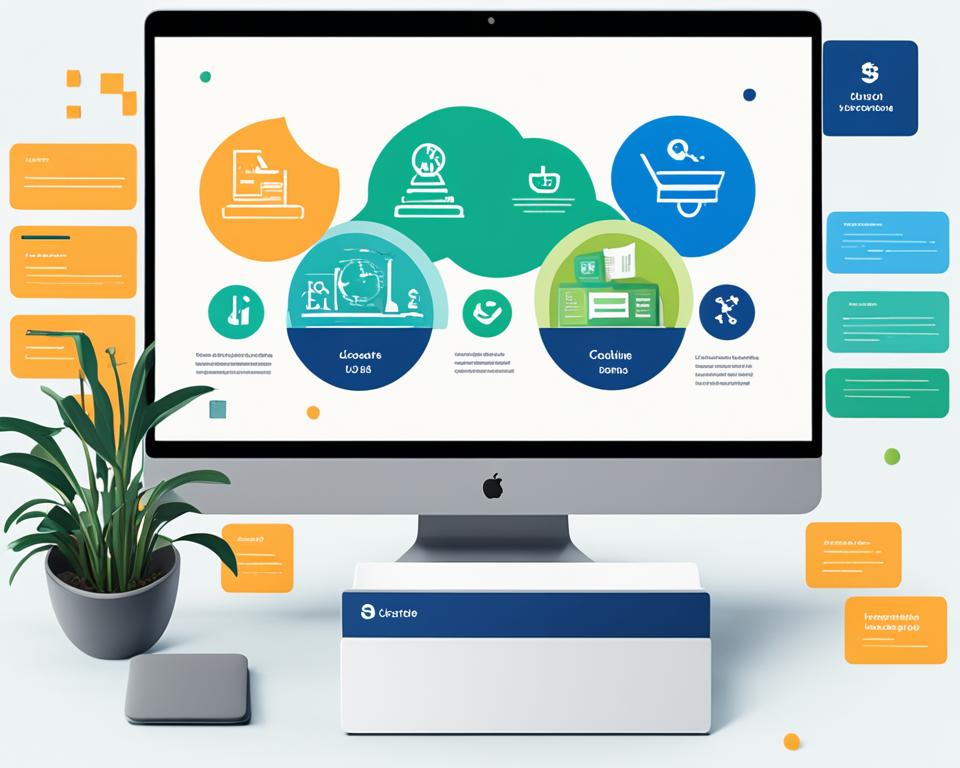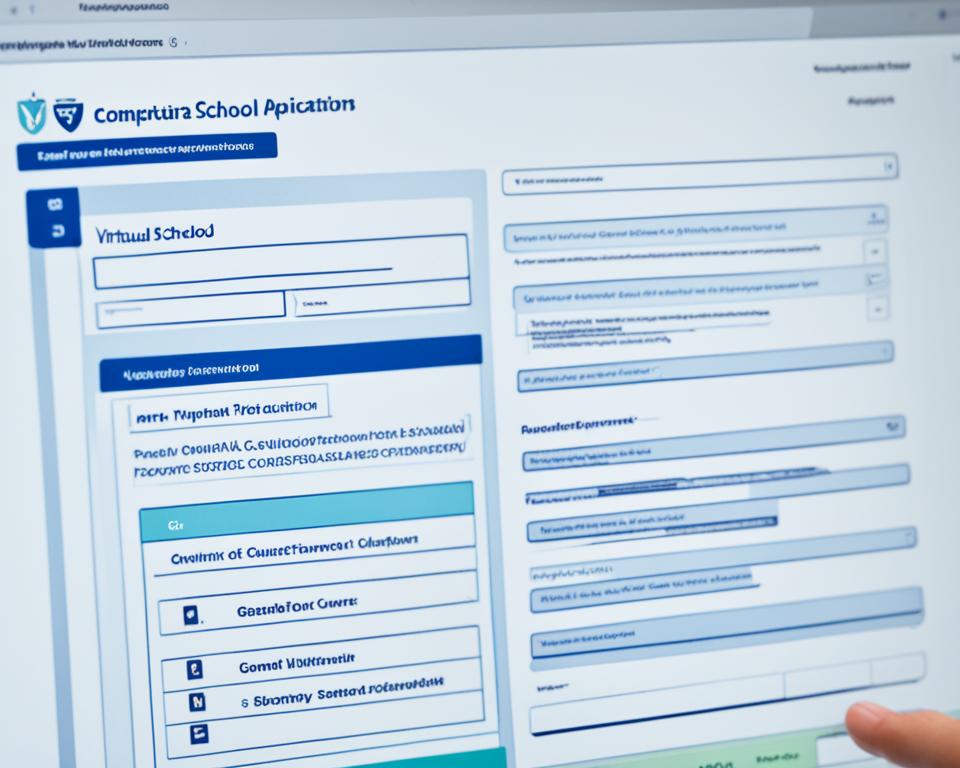Welcome to Online Schools, your comprehensive introduction to the world of online education. With the increasing availability and diverse range of courses, virtual schools have witnessed a remarkable surge in enrollment. From elementary schools to prestigious online colleges, the world of virtual education offers varying methodologies, costs, and quality. Our guides aim to assist you in finding the perfect online program that aligns with your educational goals.
At Online Schools, we delve into the motivating factors behind the millions of students choosing online courses and provide you with essential criteria to consider before enrolling. Our aim is to equip you with helpful tips and guidance as you embark on your online learning journey. With comprehensive guides spanning from K-12 to graduate school, we ensure you have access to the latest assessments of online degrees and schools available.
Virtual schools provide unparalleled convenience and flexibility through their virtual classrooms, enabling students to access education remotely via e-learning platforms and digital education. Whether you’re seeking a tailored learning experience or looking to explore the numerous benefits of online schooling, Online Schools has you covered.
Key Takeaways:
- Virtual schools offer a diverse range of courses and programs for students of all levels.
- Online education provides the flexibility of remote learning, allowing students to create personalized schedules.
- Virtual schools offer a safe and comfortable learning environment, free from physical risks.
- Online schooling provides access to courses that may not be available in traditional schools.
- Consider factors such as delivery format, accreditation, and financial aid when choosing a virtual school.
Benefits of Virtual Schools
Virtual schools offer several advantages over traditional brick-and-mortar education. The flexibility of remote learning allows you to create personalized schedules that fit your individual needs. Online education provides individualized learning opportunities, with resources and support tailored to your learning style.
The flexibility of remote learning allows you to create personalized schedules that fit your individual needs.
Virtual schools also offer a safe and comfortable learning environment, free from physical risks. With virtual classrooms, you can learn from the comfort of your own home, eliminating concerns about bullying or safety.
Additionally, virtual schools provide access to a wide variety of courses that may not be available in traditional schools. This gives you the opportunity to explore your interests and passions in greater depth and broaden your academic horizons.
Personalized Learning and Individualized Support
Virtual schools prioritize personalized learning and individualized support. With e-learning platforms and digital education, you have access to resources and support tailored to your specific learning needs.
Virtual schools prioritize personalized learning and individualized support.
Whether you’re a visual learner, an auditory learner, or prefer hands-on activities, virtual schools offer a range of resources and strategies to accommodate your learning style.
Comparison of Virtual Schools and Traditional Schools
| Virtual Schools | Traditional Schools | |
|---|---|---|
| Flexibility | Allows for personalized schedules | Follows a fixed schedule |
| Learning Environment | Safe and comfortable | Physical risks and bullying |
| Course Variety | Wide range of courses available | May have limited course options |
| Individualized Support | Resources tailored to learning style | Generalized instruction |
The table above presents a comparison between virtual schools and traditional schools, highlighting the key differences in terms of flexibility, learning environment, course variety, and individualized support.
The benefits of virtual schools, such as remote learning, e-learning, distance education, and virtual classrooms, make them an attractive option for students seeking a personalized and flexible education experience. They provide the opportunity to learn at your own pace, explore diverse course options, and receive individualized support tailored to your learning needs.
Considerations for Virtual Schooling
Before enrolling in a virtual school, there are several factors to consider. Choosing the right online learning platform and ensuring a seamless digital education experience is essential for successful online schooling.
- Delivery Format: Evaluate whether the online education program is fully online or a blended program that combines online and in-person coursework. Different types of online learning, such as synchronous and asynchronous courses, have unique requirements and learning styles.
- School Type: Examine whether the virtual school is public or private. This distinction can impact tuition rates, available funding options, and the level of control over the academic curriculum and policies.
- Accreditation: Verify if the virtual school has proper accreditation from recognized educational authorities. Accreditation ensures that the school meets rigorous standards and offers a high-quality education.
- Financial Aid and Scholarships: Explore financial aid and scholarship opportunities available specifically for families considering virtual schooling. This can help alleviate the costs associated with online education and make it more accessible for students.
| Considerations for Virtual Schooling | Description |
|---|---|
| Delivery Format | Evaluate whether the online education program is fully online or a blended program that combines online and in-person coursework. |
| School Type | Examine whether the virtual school is public or private and consider the impact on tuition rates, available funding options, and curriculum control. |
| Accreditation | Verify if the virtual school has proper accreditation from recognized educational authorities, ensuring a high-quality education. |
| Financial Aid and Scholarships | Explore financial aid and scholarship opportunities available specifically for families considering virtual schooling. |
Considering these factors will help you make an informed decision and choose the online schooling option that best suits your educational goals and needs.

Virtual Schools vs. Traditional Schools
When comparing virtual schools and traditional schools, it is essential to consider the distinct differences between the two educational models. While virtual schooling may provide fewer opportunities for in-person social interactions, it offers several advantages that enhance the learning experience.
One key advantage of virtual schools is the ability to create a positive social environment outside of the physical school setting. By eliminating the risk of negative interactions like bullying, virtual schools ensure a safe and supportive learning environment for students.
Virtual schools do require the use of technology and may encounter technical issues and distractions. However, these challenges present valuable opportunities for students to develop problem-solving skills and resilience, preparing them for the digital age.
Another important consideration is the level of parental involvement required in virtual schooling. Parents often act as learning coaches, actively participating in their child’s education and ensuring their academic progress.
Virtual schooling also demands self-discipline and time management skills from students. While these skills may initially require development, they are beneficial for academic success and future preparedness.
Ultimately, the choice between virtual schools and traditional schools depends on the individual needs and preferences of students and their families. It is important to weigh the advantages and challenges of each educational model to make an informed decision.
Virtual School Enrollment Process
Enrolling in a virtual school involves a few important steps to ensure a smooth transition. Here’s a breakdown of the virtual school enrollment process:
1. Review State Guidelines
Start by familiarizing yourself with the guidelines set by your state regarding virtual schools. Each state may have specific requirements and regulations that you need to be aware of before making a decision. This information will help you understand the options available in your area.
2. Research Online School Options
Take the time to research and explore different online school options. Look for virtual schools that align with your educational goals and priorities. Make sure to consider factors such as curriculum, support services, and extracurricular activities offered by each school.
3. Check Enrollment Deadlines
Some virtual schools have specific enrollment deadlines, while others allow enrollment throughout the year. It’s essential to know the deadlines to ensure that you submit your application on time.
4. Officially Withdraw from Current School
If you’re switching to a full-time online school that is not district-run, you’ll need to officially withdraw from your current school. This step ensures a smooth transition and avoids any complications.
5. Reach out to Online School
Contact the virtual school(s) you are interested in to gather more details about the enrollment process. This includes understanding the expectations, resources needed at home, any special requirements, and the necessary documents you will need to submit.
6. Align with the School Schedule
Once you have chosen a virtual school, make sure to align your schedule with the school’s timetable. This includes understanding the start and end dates, as well as any specific learning routines or online sessions that need to be followed.
7. Create a New Learning Routine
In partnership with your student, create a new learning routine that suits the online school environment. Establish a schedule that allows for productive learning, breaks, and extracurricular activities while ensuring a proper work-life balance.
By following these steps, you can navigate the virtual school enrollment process successfully and set your student up for a rewarding online education experience.
| Benefits | Considerations |
|---|---|
| Flexible scheduling | Limited in-person social interaction |
| Individualized learning opportunities | Parental involvement in education |
| Safe and comfortable learning environment | Technical challenges and distractions |
| Access to a variety of courses | Requires self-discipline and time management skills |

Virtual Schooling Options by State
When it comes to virtual schooling, options can vary depending on the state you reside in. Let’s take a closer look at the different virtual schooling options available across the United States.
Free Online Public Schools
Approximately 35 states and the District of Columbia offer free, full-time online public schools for grades K-12. These virtual schools provide students with the opportunity to receive a quality education from the comfort of their own homes. By enrolling in these online public schools, students can access virtual classrooms, interact with teachers, and engage in collaborative learning with their peers. The curriculum follows state guidelines, ensuring that students meet the necessary academic requirements.
Grade-Specific Online Schooling
In some states, online schooling is available for specific grade levels. This allows students to transition seamlessly from traditional schools to virtual classrooms at certain points in their educational journey. Whether it’s for elementary, middle, or high school, grade-specific online schooling provides flexibility and tailored learning experiences to students in those particular stages of education.
Course Access Programs
In addition to full-time virtual schools, many states offer course access programs that allow students to supplement their traditional education with online courses. These programs give students the opportunity to explore subjects that may not be available at their local schools or to take advanced courses to challenge themselves academically. Course access programs provide students with a wider range of educational options and help cater to their individual interests and goals.
Private Online Schools
While not every state offers free online schooling, paid options are available in all 50 states. Private online schools provide an alternative to traditional brick-and-mortar education, offering personalized learning experiences and access to a comprehensive curriculum. These schools often have their own guidelines and standards, allowing for more flexibility in terms of course selection and instructional methods.
When considering virtual schooling, it’s crucial to review your state’s guidelines and regulations. Understanding the options available to you will help you make an informed decision and find the best virtual school that aligns with your child’s educational needs and goals.
| State | Free Online Public Schools | Grade-Specific Online Schooling | Course Access Programs | Private Online Schools |
|---|---|---|---|---|
| Alabama | Yes | No | Yes | Yes |
| Alaska | Yes | No | Yes | Yes |
| Arizona | Yes | Yes | Yes | Yes |
| Arkansas | Yes | No | Yes | Yes |
| California | Yes | Yes | Yes | Yes |
Pros and Cons of Virtual Schooling
Virtual schooling offers a range of advantages and disadvantages that families should consider before making a decision. Understanding these pros and cons can help you determine if virtual schooling is the right fit for your child’s educational needs. Let’s explore them below:
Advantages of Virtual Schooling:
- Flexibility: Virtual schooling allows for personalized schedules, giving students the freedom to learn at their own pace.
- Individualized Learning: Online education provides tailored resources and support to cater to each student’s unique learning style.
- Safe and Comfortable Learning Environment: Virtual classrooms remove the physical risks associated with traditional schools, creating a secure and comfortable atmosphere for students.
- Access to a Variety of Courses: Virtual schools often offer a wide range of courses, giving students the opportunity to explore their interests and passions.
Disadvantages of Virtual Schooling:
- Lack of Social Interaction: Virtual schooling may limit face-to-face social interactions, resulting in decreased opportunities for in-person connections.
- Parental Involvement: Successful virtual schooling requires a higher level of parental involvement, as parents may need to act as learning coaches and actively participate in their child’s education.
- Self-Discipline and Time Management: The flexible nature of virtual schooling demands self-discipline and strong time management skills from students, as they are responsible for independently managing their coursework and assignments.
- Technological Challenges: Virtual schooling relies on technology, which can present technical issues and distractions that students must navigate.
“Virtual schooling provides flexibility and individualized learning, but it may lack social interaction and require self-discipline and parental involvement.”
As you consider virtual schooling, evaluate the pros and cons in relation to your child’s specific needs and aspirations. Every student is unique, and what may be advantageous for one may pose challenges for another. By weighing these factors, you can make an informed decision that sets your child up for academic success.
Next, we’ll discuss how virtual schooling can be personalized to meet each student’s educational goals.
Virtual Schooling for Personalized Education
Virtual schooling offers a unique opportunity for personalized education, allowing students to tailor their learning experience to their individual needs and interests. With virtual schools, you have the freedom to learn at your own pace, receive individualized attention from teachers, and explore a wide range of courses that may not be available in traditional schools.
This personalized approach fosters a love for learning by creating an environment where students can fully engage with their education. It encourages curiosity and allows students to delve deeper into subjects that excite them. Whether it’s advanced math, creative writing, or digital art, virtual schooling provides the flexibility to pursue your passions.
Through virtual schooling, students also develop valuable skills that are essential for success in the digital age. Self-discipline is cultivated as you navigate your own learning journey, taking responsibility for managing your time and staying motivated. You’ll become adept at time management, juggling coursework, assignments, and personal commitments.
Problem-solving is another skill that virtual schooling nurtures. As you encounter challenges in navigating online platforms or adjusting to new technology, you’ll learn to troubleshoot and find solutions independently. These problem-solving skills extend beyond the virtual classroom and are transferable to real-world situations.
Here’s a snapshot of the benefits that virtual schooling offers for personalized education:
| Benefits of Virtual Schooling for Personalized Education |
|---|
| Flexibility to learn at your own pace |
| Access to a wide range of courses |
| Individualized attention from teachers |
| Encourages exploration of personal interests |
| Develops self-discipline and time management skills |
| Nurtures problem-solving abilities |
By embracing the opportunities that virtual schooling provides, you can excel academically and prepare yourself for future endeavors. The personalized education experience offered by virtual schools empowers you to become a lifelong learner, equipped with the skills and knowledge to thrive in an ever-changing world.
The Future of Virtual Schooling
Virtual schooling has emerged as a popular and credible alternative to traditional education. As technology continues to advance, the future of virtual schooling holds immense potential, paving the way for further advancements in educational practices.
One of the key advantages of virtual schooling is the ability to personalize education. With curriculum differentiation and tailored learning experiences, virtual schools can cater to the unique needs and interests of individual students. This personalized approach promotes a deeper understanding of concepts and fosters a love for learning.
Moreover, virtual schooling equips students with essential tech-savvy skills, preparing them for the digital world. As technology continues to shape various aspects of our lives, virtual schooling ensures that students are equipped with the necessary skills and knowledge to thrive in the digital age.
As more families experience the benefits of virtual schooling, the popularity and growth of this mode of education are expected to continue in the future. The convenience, flexibility, and tailored learning experiences offered by virtual schools make them an appealing choice for many parents and students.
Furthermore, the ongoing advancements in technology will likely lead to the development of more interactive and engaging virtual learning experiences. Virtual reality (VR), augmented reality (AR), and artificial intelligence (AI) are already making their way into the virtual classroom, enhancing the learning experience and making it more immersive.
With the continued evolution of virtual schooling, it is expected that more schools and educational institutions will embrace online education as a mainstream approach. This shift will enable students from diverse backgrounds and geographical locations to access quality education that suits their needs.
| Pros of Virtual Schooling | Cons of Virtual Schooling |
|---|---|
|
|
Despite the challenges, the future of virtual schooling looks promising. As technology continues to advance and virtual schools refine their methodologies, virtual schooling is set to revolutionize the education landscape and provide students with an innovative and effective learning experience.
Conclusion
Virtual schools offer a convenient and flexible option for online education, providing tailored learning experiences for students. Despite the unique advantages and challenges they present, virtual schooling is a viable choice for families seeking a personalized and safe education. By considering the pros and cons, exploring state guidelines, and researching available options, families can make informed decisions that best meet their child’s needs.
Virtual schooling opens doors to a new way of learning, preparing students for success in the digital age. Through online education, students have the opportunity to learn at their own pace and explore a wide range of courses. They can develop essential skills like self-discipline, time management, and problem-solving, while also pursuing their interests and passions.
As virtual schooling becomes increasingly mainstream, it is expected to continue evolving and improving. With advancements in technology, the future of virtual schooling holds even more possibilities for personalized education and tailored learning experiences. By embracing virtual schools, students can thrive academically and gain the necessary skills to excel in a digital world.
FAQ
What is virtual schooling?
Virtual schooling refers to online education, where students access their courses remotely through digital platforms instead of attending traditional physical classrooms.
What are the benefits of virtual schools?
Virtual schools offer flexibility in creating personalized schedules, individualized learning opportunities, a safe learning environment, and access to a variety of courses.
What factors should I consider before enrolling in a virtual school?
It’s important to consider the delivery format, accreditation status, and financial aspects of the virtual school, as well as exploring the level of parental involvement required.
How are virtual schools different from traditional schools?
Virtual schools provide the advantages of individualized learning, a safe environment, and access to a wider range of courses, but may lack in-person social interactions and require more parental involvement.
What is the enrollment process for virtual schools?
The enrollment process involves reviewing state guidelines, researching online school options, and aligning with the chosen school’s schedule while creating a new learning routine.
What virtual schooling options are available by state?
Approximately 35 states and the District of Columbia offer free, full-time online public schools, while paid options are available in all 50 states. Availability may vary, so it’s important to review state guidelines.
What are the pros and cons of virtual schooling?
Virtual schooling offers personalized education, but may lack social interaction and require self-discipline and parental involvement. It also presents technological challenges that can be overcome with time.
How does virtual schooling provide personalized education?
Virtual schooling allows students to learn at their own pace, receive individualized attention, and explore their interests through a wide range of courses, fostering a love for learning.
What does the future hold for virtual schooling?
With advancements in technology, virtual schooling is expected to further personalize education, prepare students for the digital world, and continue growing and evolving as a viable education option.
Why should I consider virtual schools for online education?
Virtual schools provide convenience, flexibility, and tailored learning experiences, making them a suitable option for families seeking a personalized and safe education.





